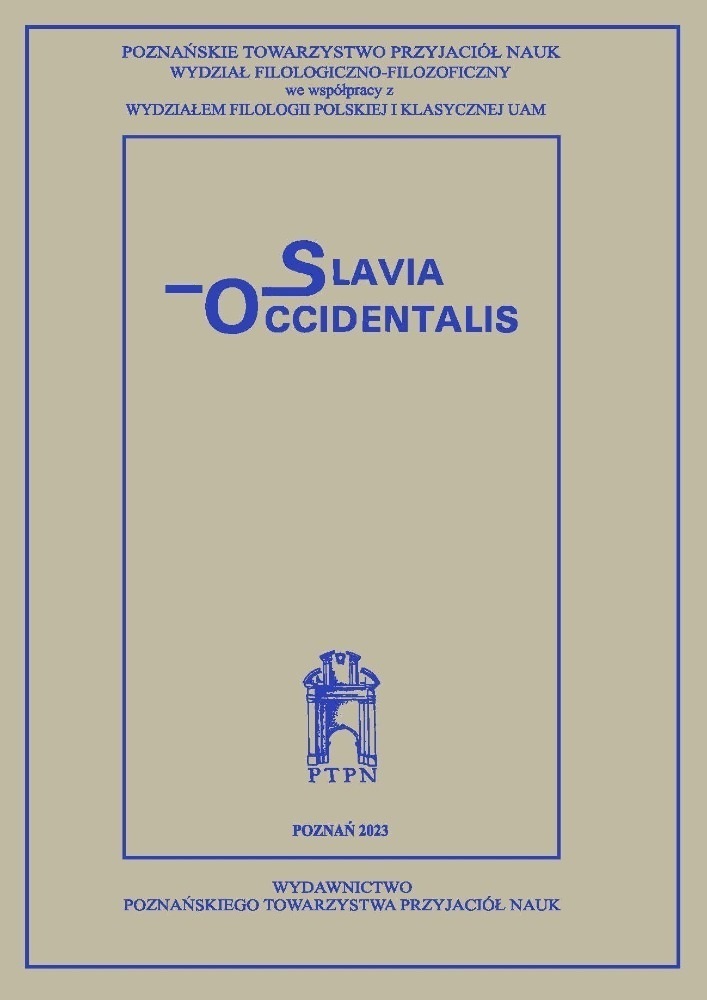Abstrakt
Published in 1866, “Łužiski serbski słownik” compiled by Křesćan Bohuwěr Pful was completed as a result of cultural and national revival of Slavic Lausatians and constitutes the first reliable work on the lexis of the Upper Sorbian language. A comparison of the lexical corpus constituting this dictionary with the language used in the press of the time (the material has been excerpted from two year’s issues of the weekly ”Tydźenska Nowina” (Weekly messages) published in 1851 and 1853) seems to be sufficient enough to evaluate the lexis included in the Pful’s dictionary and to provide an answer to what extent this lexicon recorded the vocabulary of the first decades of the national revival. A juxtaposition of the material demonstrates that the Pful dictionary largely reflects the development of the Upper Sorbian language in the latter half of the nineteenth century, for the material encompasses not only the vocabulary of the past centuries but also contemporary loans and borrowings from the Czech language, less frequently from Polish or, generally Slavic loans, to be found in the press. Pful also records a number of older Germanisms. Interestingly enough, the dictionary does not include words that are used internationally though they are quite frequent in the issues of ”Tydźenska Nowina”. Pful replaces them with his propositions of either borrowings from the Czech language or neologisms of his own, often modeled after their Czech counterparts. The dictionary also lacks numerous compounds, collocations and the words that had been apparently coined by the editors of the weekly (oftentimes loan translations from German, e.g. płododružiny (Fruchtarten)). The Pful’s dictionary is also characterized by a certain discernible excess of lexical propositions of the author himself as compared to the actual material excerpted from the publication. The above should be rather treated as an expression of the author’s deliberate attempt to enliven and enrich the Upper Sorbian lexis at the time of the awakening of Sorbian consciousness.Bibliografia
Jentsch H., Die Entwicklung der Lexik der Obersorbischen Schriftsprache vom 18. Jahrhundert bis zum Beginn des 20. Jahrhunderts, Bautzen 1999.
Jungmann J., Slovník česko-německý, Praha 1835–1839, wyd. ACADEMIA, Praha 1989–1990.
Lewaszkiewicz T., Dziedzictwo leksykalne epoki Pfula i Smolera we współczesnej górnołużycczyźnie (na przykładzie formacji z zakresu apelatywnych nazw miejsc), „Lětopis“ 1986 / Rjad A.
Lewaszkiewicz T., Rola prasy górnołużyckiej z lat 1842–1853 w kształtowaniu słownictwa języka literackiego (Rekonesans badawczy), [w:] Uwarunkowania i przyczyny zmian językowych, Seria „Język na pograniczach”, nr 11 SOW, Warszawa 1994, s. 71–85.
Orłoś T.Z., Zapożyczenia polskie w słowniku Jungmanna, Wrocław – Warszawa – Kraków 1967.
Pful K.B., Łužiski serbski słownik, Budyšin 1866 (wydanie fotooffsetowe 1968).
Siatkowska E., Slawizmy u Lindego, Jungmanna i Pfula w ujęciu porównawczym, „Bohemistyka” 1–4/2008, s. 159–182.
Stone G., Lexical Changes in the Upper Sorbian Literary Language during and following the National Awakening, „Lětopis“ 1971 / Rjad A.
Licencja

Utwór dostępny jest na licencji Creative Commons Uznanie autorstwa – Użycie niekomercyjne – Bez utworów zależnych 4.0 Międzynarodowe.
